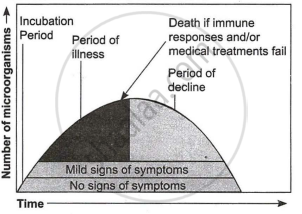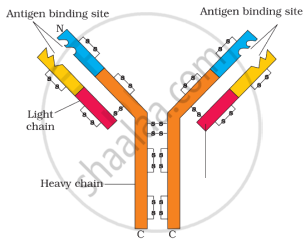Advertisements
Advertisements
Question
| When a microorganism invades a host, a definite sequence of events usually occurs leading to infection and disease, causing suffering to the host. This process is called pathogenesis. Once a microorganism overcomes the defence system of the host, development of the disease follows a certain sequence of events as shown in the graph. Study the graph given below for the sequence of events leading to the appearance of a disease and answer the questions that follow: |

(a) In which period, according to the graph there are maximum chances of a person transmitting a disease/infection and why? (1)
(b) Study the graph and write what is an incubation period. Name a sexually transmitted disease that can be easily transmitted during this period. Name the specific type of lymphocytes that are attacked by the pathogen of this disease. (2)
OR
(b) Draw a schematic labelled diagram of an antibody. (2)
(c) In which period, the number of immune cells forming antibodies will be the highest in a person suffering from pneumonia? Name the immune cells that produce antibodies. (1)
Solution
(a) Period of illness: The number of disease-causing microorganisms reaches its maximum during the period of illness so, there are maximum chances of a person transmitting a disease/infection at this stage.
(b) The incubation period refers to the period from the absence of symptoms to the beginning of minor symptoms. The incubation period is the length of time between the introduction of germs and the onset of the first illness symptoms. For instance, chickenpox takes 14-16 days to incubate. The sexually transmitted illness that can spread during this time is AIDS. The pathogen in this disease targets a specific type of cell called a macrophage.
OR
(b)

Structure of an antibody molecule
(c) In a person suffering from pneumonia, the number of immune cells forming antibodies will be at its highest during the period of illness. Antibodies are produced by B-lymphocytes.
APPEARS IN
RELATED QUESTIONS
A vast variety of different pathogens or foreign molecules are recognized during acquired immune response. This property is known as ______.
Phagocytic barriers of innate immunity involve ______
Which one engulfs pathogens rapidly?
Crypts of lieberkuhn are present in ______.
Antibodies in our body are complex:
Acquired immunity is due to ______
Active immunity development is related to ______.
Differentiate between active immunity and passive immunity.
Cellular factors in innate immunity is provided by ______.
The type of immunity develops in the foetus after receiving antibodies through placenta is ______.
